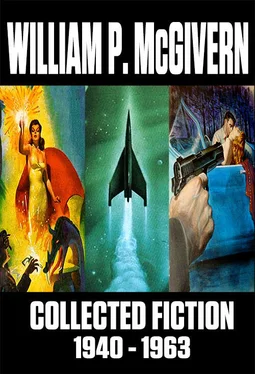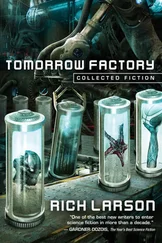Уильям Макгиверн - Collected Fiction - 1940-1963
Здесь есть возможность читать онлайн «Уильям Макгиверн - Collected Fiction - 1940-1963» весь текст электронной книги совершенно бесплатно (целиком полную версию без сокращений). В некоторых случаях можно слушать аудио, скачать через торрент в формате fb2 и присутствует краткое содержание. Год выпуска: 2014, Издательство: Jerry eBooks, Жанр: Ужасы и Мистика, Фантастика и фэнтези, Детектив, Прочие приключения, на английском языке. Описание произведения, (предисловие) а так же отзывы посетителей доступны на портале библиотеки ЛибКат.
- Название:Collected Fiction: 1940-1963
- Автор:
- Издательство:Jerry eBooks
- Жанр:
- Год:2014
- ISBN:нет данных
- Рейтинг книги:3 / 5. Голосов: 1
-
Избранное:Добавить в избранное
- Отзывы:
-
Ваша оценка:
- 60
- 1
- 2
- 3
- 4
- 5
Collected Fiction: 1940-1963: краткое содержание, описание и аннотация
Предлагаем к чтению аннотацию, описание, краткое содержание или предисловие (зависит от того, что написал сам автор книги «Collected Fiction: 1940-1963»). Если вы не нашли необходимую информацию о книге — напишите в комментариях, мы постараемся отыскать её.
Collected Fiction: 1940-1963 — читать онлайн бесплатно полную книгу (весь текст) целиком
Ниже представлен текст книги, разбитый по страницам. Система сохранения места последней прочитанной страницы, позволяет с удобством читать онлайн бесплатно книгу «Collected Fiction: 1940-1963», без необходимости каждый раз заново искать на чём Вы остановились. Поставьте закладку, и сможете в любой момент перейти на страницу, на которой закончили чтение.
Интервал:
Закладка:
Bogan shook his head sharply; his thoughts were distracting him, flickering brightly and erratically against the quiet darkness of his mind.
“Please!” the girl cried again. “Fumes are coming up through the floor boards. I can’t breathe.”
“I’ll roll down the window,” he said, smiling. “I’m not going to slop, so you might as well forget your little tricks.”
The cold damp wind swept over her chilled body. She was suddenly dose to panic; this was what excited him, to toy with her in a cat-and-mouse fashion, relishing her helplessness. If she couldn’t get him to stop, there was no hope — unless a patrol car flagged him down. But the police obviously had no way of identifying him. Otherwise he wouldn’t be driving along so confidently. How could she attract the attention of the police?
To herself or to the car, it made no difference.
But she could do nothing at all while she was helpless. She began to strain at the bands about her wrists, twisting her hands until the skin was raw, exerting all her wiry strength against the silken fabric. The young man hadn’t done too efficient a job, and she blessed him for it. Perhaps he’d given her this chance deliberately. The knots were loose, and her struggles produced a precious half inch of slack. That was almost enough, for her hands were quite small. She tried again, twisting her wrists silently and desperately until the knots slipped again. This was enough. She freed her hands and put them over her mouth to silence the sounds of her rapid, shallow breathing.
But there was still not much she could do. She could unlatch the rear door, but to push it open against the wind stream would be almost impossible in her cramped position. And it wouldn’t serve any purpose unless she intended to throw herself from the car. That thought instantly led to another — if not herself, what else was there to throw from the car? Specifically, through the opened window — beside the driver’s seat? The crumpled silk tie that had bound her wrists probably wouldn’t attract anyone’s attention. She felt cautiously about the floor of the car, but found only a folded newspaper and what seemed to be an empty cigarette package. No good. It had to be something that would point to her.
She thought of removing a shoe but after a painful effort realized that it wasn’t possible. She could arch her back and grasp her ankles in her hands, but she couldn’t unbuckle the bell or untie the shoelaces in that position. And she couldn’t risk turning over and sitting up. He would be sure to see the top of her head in the rearview mirror. But the thought of shoes prompted her to take a personal inventory. Ring, small comb, hair ribbon, a pencil clipped in the pocket of her uniform. Thai was all; and none of these had any special significance. They would mean nothing to whoever found them.
“That’s enough air,” Bogan said, and began to roll up the window.
“No, please!” Her heart was beating wildly; she had just remembered the apron she was wearing, the short, white tea apron with the restaurant’s distinctive emblem emblazoned on it. Everybody associated the emblem with Howard Johnson’s; it was as identifiable as a signature “Please don’t close the window. I’m suffocating.” The terror in her voice was genuine; if he closed the window now her only chance would be gone.
“Well, we don’t want that,” he said and rolled the window down again. “We want you nice and healthy for your handsome trooper. You wouldn’t be pretty if you smothered to death.”
Conclusion
The maniac was trapped — but he could kill again.
XIII
She worked quickly to untie the knot that secured the apron about her waist. When it came free she raised herself cautiously on one elbow and looked up at the window, careful to keep her head below the top of the front seat. It wasn’t possible, she realized with despair; his big shoulder and arm completely sealed off the area between the back seat and open window. If she tried to push the apron past him, he would feel the pressure of her hand and sense that she was moving behind his back.
Bogan said, “We’re running a bit late. I’ll have to step on it. But don’t you worry. I won’t be caught speeding.”
The car swerved into the left, or passing, lane, body rocking on its springs, and she saw his head and shoulders move forward out of sight at the same time. He had hunched closer to the windshield to see more clearly while passing. Now the sway of the car told her they had cut back into the middle lane, and at the same time she saw his head and shoulders loom above her, returning to their customary position.
She breathed a soft prayer. When he moved forward, the open window was clear and unobstructed by his bulk. And if he passed another car he would be likely to push himself forward again.
She made a ball of the apron in her right hand, and raised her arm cautiously. When he passed another car she wouldn’t be able to look up to see if he had moved forward; he would be close to the rear-view mirror then and apt to notice any movement behind him. She would have to gamble — her only hope — shoving the apron up and out the window without looking, and praying that her hand didn’t strike his shoulder.
They drove for several minutes in the middle lane.
“That’s enough air,” he said with a vicious snap to his voice. “When I get around this truck, the window goes up and stays up. Why should I care whether you’re comfortable? Do you have any sympathy for me? Do you care about me at all?”
The car swerved to the left and gained speed, with the tires whining on the wet pavement. She counted to three slowly, trying to control the paralyzing fear that gripped her body. Now, she thought, but couldn’t force her hand to move. The car was swerving back into the middle lane, and she bit down viciously on her trembling lip and said “Now!” in a desperate little whisper.
She thrust her hand toward the window, dreading a contact with his body; but she felt nothing but the wet wind like ice against her knuckles. A fold of the cloth made a tearing noise in the windstream. She held the apron between thumb and forefinger, felt it tug and billow against her grip, then released it; and as she snaked her hand away from the window, Bogan settled back in the seat, and her fingers made a tiny whispering sound on the fabric of his coat.
But he didn’t seem to notice. He said, “If you want to smother, go ahead,” and rolled the window up tightly. “Why should I care?” There was a dangerous, vengeful tone in his voice. “I don’t care if your face turns black and your lungs burst.” Bogan flipped on the car’s radio.
She lay completely still, exhausted by fear and tension. The back of one hand was tight to her lips to hold back a sob.
XIV
The salesman whose name was Harry Mills swore angrily and fluently as he swung his car onto the graveled roadway that flanked the turnpike. His wife, Muriel, was in tears; her voice shook as she said, “We could have been killed, Harry. You almost lost control.”
“Of course I did,” Harry Mills said furiously. “I couldn’t see the road for a full five seconds. The damn thing was plastered right over the windshield wipers. I’m going to report this.” He climbed from his car, redfaced and pugnacious, and walked around to his wife’s side. “Some cop’ll stop pretty soon,” he said, and turned his overcoat collar up against the rain. “We’re alive and kicking, hon. I guess we’re lucky at that.”
“What was it’?” she asked in the same high, frightened voice. “What did those fools throw from the window?”
“Well, it’s still tangled in the wiper,” he said, and he began to extricate the soggy piece of cloth which had blown from the car ahead of him to plaster itself across his windshield. He spread it out on the hood. “Well, how about that?” he said, and pushed his hat up on his forehead.
Читать дальшеИнтервал:
Закладка:
Похожие книги на «Collected Fiction: 1940-1963»
Представляем Вашему вниманию похожие книги на «Collected Fiction: 1940-1963» списком для выбора. Мы отобрали схожую по названию и смыслу литературу в надежде предоставить читателям больше вариантов отыскать новые, интересные, ещё непрочитанные произведения.
Обсуждение, отзывы о книге «Collected Fiction: 1940-1963» и просто собственные мнения читателей. Оставьте ваши комментарии, напишите, что Вы думаете о произведении, его смысле или главных героях. Укажите что конкретно понравилось, а что нет, и почему Вы так считаете.

![Уильям Макгиверн - Завтра опять неизвестность [английский и русский параллельные тексты]](/books/35168/uilyam-makgivern-zavtra-opyat-neizvestnost-angli-thumb.webp)









